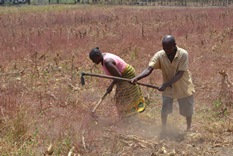Last Updated on Friday, 03 October 2014 11:38

Kenya’s Ministry of Agricultural, Education, the UN, World Bank and farmer groups were recently convened at an event where organisations Alliance for a Green Revolution in Africa (AGRA), Farm Concern International, Imperial College London’s Partnership for Child Development (PCD), Dutch NGO, SNV, and the World Food Programme outlined how they assist the earning potential of over 33,000 Kenyan farmers by connecting them to markets to sell their product to.
Read more: Learning Together to Improve Kenya Farmer Livelihoods





